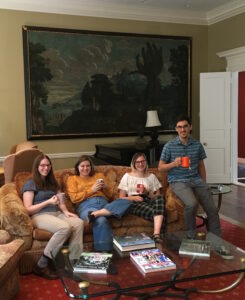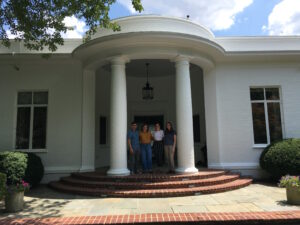 As anyone who has passed through the offices of the CHS this summer and was greeted by the sight of four interns taking up an entire office knows, we are a package deal. After the first two weeks of the summer, during which we learned how to convert xml files for Perseus’ new Scaife Viewer, digitizing Homeric papyri in collaboration with papyrologists from the University of Heidelberg for papyri.info, and correcting machine-read (OCR) texts for the First One Thousand Years of Greek project through Lace, we got used to spending a lot of time together. Coming from colleges across the United States, we all brought our own strengths and perspectives. Some of us already had technical experience and familiarity with other Digital Humanities projects, while others were blank slates. As time passed, we learned from each other and worked together to make our own small contributions to the field.
As anyone who has passed through the offices of the CHS this summer and was greeted by the sight of four interns taking up an entire office knows, we are a package deal. After the first two weeks of the summer, during which we learned how to convert xml files for Perseus’ new Scaife Viewer, digitizing Homeric papyri in collaboration with papyrologists from the University of Heidelberg for papyri.info, and correcting machine-read (OCR) texts for the First One Thousand Years of Greek project through Lace, we got used to spending a lot of time together. Coming from colleges across the United States, we all brought our own strengths and perspectives. Some of us already had technical experience and familiarity with other Digital Humanities projects, while others were blank slates. As time passed, we learned from each other and worked together to make our own small contributions to the field.
One highlight of the summer was the workshop conducted by the Heidelberg professors on papyri. During this workshop, we learned Leiden conventions, had a crash course in paleography, and how to enter information into a papyrological database. Once our mentors returned to Germany, we conducted weekly Zoom meetings to continue our collaboration on the project. Another major project involved converting as many files of Plutarch’s Moralia as possible. At first this task seemed daunting; however, as of the last day of our internship we have converted every single file from works such as Herodotus’ Malice to Which are the Most Crafty, Water Animals or Those Creatures that Breathe Upon the Land?. Working on these projects was rewarding for us knowing that we were helping make these texts freely available to scholars and the general public.
Our projects were not our only exposure to the field of Digital Humanities. Throughout the summer, we attended 2021 Delphic Games Preview, the Africana Bloomsday event, and sessions of the Homer Multitext Project and Greek Myth, Mapped. Meeting scholars from all over the world committed to furthering access to resources that enrich knowledge of the Classical world gave us an understanding of the wide scope of Digital Humanities in Classics. We learned about Africana and Classical reception of Joyce’s Ulysses from Carolivia Herron’s students, the importance of recognizing all manuscripts and their variations as equally valid, and discussed the ontology of Greek myth with Greta Hawes and Scott Smith. Lunches at the Center promoted discussion and bonding over not just classics, but also our mutual love of Netflix. The opportunity to interact with a diverse group of scholars gave us all a better idea of the many paths available to aspiring digital humanists.
Outside of working hours, we took full advantage of what D.C. has to offer. One of our preferred activities was visiting museums. Highlights include National Geographic’s Queens of Egypt exhibit, the Apollo 50 festival at the Air and Space Museum, and the National Museum of Women in the Arts. The facilities at the CHS allowed us all to pursue our independent research projects on the Aesop’s Fables of Romulus Anglicus Cunctis, reception of Greek Tragedy in Irish literature, Seneca’s Apocolocyntosis, and gendered language in Plutarch’s Life of Antony. Research was not our only activity. We also prepared many group dinners in House B’s kitchen and used the smart TV in the common room to watch all 12 episodes of I, Claudius. Over those last eight weeks, the Center has become another home for all of us.
 We would like to thank those who patiently trained us, namely Lia Hanhardt, Rodney Ast, Julia Lougovaya, and James Cowey. Also thanks to Bruce Robertson and Lisa Cerrato for giving us the opportunity to contribute to their important projects. Without their support, we would not have been able to digitize 75 Homeric papyri, correct 117 Lace pages, and convert 257 files of Plutarch’s Moralia — over 700,000 words of Greek which will soon be available on Perseus’ Scaife Viewer. Special thanks to Allie Marbry, Lenny Muellner, Lanah Koelle, Temple Wright, Michael Strickland, Erika Bainbridge, Sylvia Henderson, Noel Spencer, Zoie Lafis, Ruth Taylor, Greg Nagy and the rest of the CHS staff for making our time at the Center both comfortable and meaningful.
We would like to thank those who patiently trained us, namely Lia Hanhardt, Rodney Ast, Julia Lougovaya, and James Cowey. Also thanks to Bruce Robertson and Lisa Cerrato for giving us the opportunity to contribute to their important projects. Without their support, we would not have been able to digitize 75 Homeric papyri, correct 117 Lace pages, and convert 257 files of Plutarch’s Moralia — over 700,000 words of Greek which will soon be available on Perseus’ Scaife Viewer. Special thanks to Allie Marbry, Lenny Muellner, Lanah Koelle, Temple Wright, Michael Strickland, Erika Bainbridge, Sylvia Henderson, Noel Spencer, Zoie Lafis, Ruth Taylor, Greg Nagy and the rest of the CHS staff for making our time at the Center both comfortable and meaningful.
-Karina Cooper, Ethan Della Rocca, Sophia Elzie, and Lucy Parr
-
Fellowships
- Fellowships in Hellenic Studies
- Early Career Fellowships
- Summer Fellowships
- CHS-IHR Joint Fellowship
- Current Fellows in Hellenic Studies
- Previous Fellows Previous Fellows – Chronological Lists
-
The Library
- Accessing the Library
- Navigating the Collection and HOLLIS
- Library Exhibits
- New Books
- Book Donations Policy
